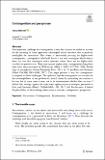Contingentism and paraphrase
Author(s)
Werner, Jonas
Download11098_2024_Article_2106.pdf (870.0Kb)
Publisher with Creative Commons License
Publisher with Creative Commons License
Creative Commons Attribution
Terms of use
Metadata
Show full item recordAbstract
One important challenge for contingentists is that they seem to be unable to account for the meaning of some apparently meaningful modal discourse that is perfectly intelligible for necessitists. This worry is particularly pressing for higher-order contingentists, contingentists who hold that it is not only contingent which objects there are, but also contingent which semantic values there are for higher-order variables to quantify over. Objections against higher-order contingentism along these lines have been presented in Williamson (Mind 119(475):657–748, 2010; Modal logic as metaphysics, Oxford University Press, 2013, ch. 7), and Fritz and Goodman (Mind 126(504):1063–1108, 2017). This paper presents a way for contingentists to respond to these challenges. The upshot is that the contingentist can account for the meaningfulness of the problematic modal claims by pretending necessitism to be true, but in some cases it turns out to be indeterminate whether they are true. I defend this strategy against the objections against pretence-strategies presented in Fritz and Goodman (Mind 126(504):1063–1108, 2017, §4). Furthermore, I defend the plausibility of the resulting indeterminacy from the contingentist’s perspective.
Date issued
2024-02-14Department
Massachusetts Institute of Technology. Department of Linguistics and PhilosophyPublisher
Springer Science and Business Media LLC
Citation
Werner, J. Contingentism and paraphrase. Philos Stud (2024).
Version: Final published version
ISSN
0031-8116
1573-0883
Keywords
Philosophy